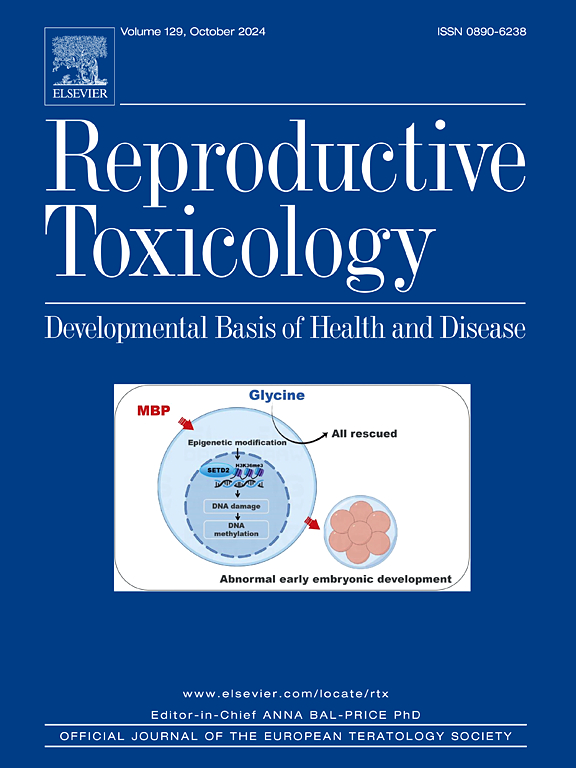大麻提取物和生育能力:雄性和雌性Wistar大鼠的临床前评估。
IF 2.8
4区 医学
Q2 REPRODUCTIVE BIOLOGY
引用次数: 0
摘要
目前,对大麻提取物的药用用途及其对生育能力的潜在影响有保留意见。某些大麻素,如Δ9-tetrahydrocanabinol (THC),可以调节男性和女性的性激素,可能导致受精能力的改变。本研究旨在评估标准大麻提取物(CSE)及其相应安慰剂对Wistar大鼠(包括雄性和雌性)生育能力和早期胚胎发育的影响。这些动物被分为7组,每组20只动物,给予不同剂量的大麻提取物(160.32mg/mL)来评估生育结果。男性和女性的生育能力评估是根据“药物开发所需的非临床毒理学和药理学安全研究指南”中概述的指导方针进行的,包括临床检查、生化分析、宏观评估、相对器官重量测量、精子产生、形态评估以及睾丸的形态计量学和组织病理学分析。结果表明,试验剂量(0.28、2.8、28或56mg/kg/bw)均未显著影响雄性或雌性大鼠的性激素水平。此外,未观察到男性器官形态和精子特征的改变。在雌性大鼠中,在所有剂量下,生育能力都没有受到影响,胚泡着床也没有受损,甚至在妊娠确认后7天。未观察到对胚胎的直接毒性作用。总之,用大麻提取物治疗没有导致雄性或雌性大鼠的生育能力或怀孕可行性的任何显着变化。本文章由计算机程序翻译,如有差异,请以英文原文为准。
Cannabis sativa extract and fertility: Preclinical evaluation in male and female Wistar rats
Currently, there are reservations regarding the medicinal use of Cannabis sativa extract and its potential to impact fertility. Certain cannabinoids, such as Δ9-tetrahydrocanabinol (THC), can modulate both male and female sex hormones, potentially leading to alterations in fertilization viability. This study aims to evaluate the effects of standardized Cannabis sativa extract (CSE) and its respective placebos on fertility and early embryonic development in Wistar rats, including both male and female subjects. The animals were divided into 7 groups, each consisting of 20 animals, and different doses of a Cannabis sativa extract (160.32 mg/mL) were administered to assess fertility outcomes. Male and female fertility assessments were conducted according to the guidelines outlined in the "Guide for the Conduct of Non-Clinical Toxicology and Pharmacological Safety Studies Required for Drug Development," including clinical exams, biochemical analyses, macroscopic evaluations, relative organ weight measurements, sperm production, and morphology assessments, as well as morphometric and histopathological analyses of the testes. The results indicated that none of the tested doses (0.28, 2.8, 28, or 56 mg/kg/bw) significantly affected sex hormone levels in either male or female rats. Additionally, no alterations were observed in male organ morphology and sperm characteristics. In female rats, fertility was unaffected, and blastocyst implantation was not impaired across all doses, even up to 7 days post-pregnancy confirmation. No direct toxic effects on the embryo were observed. In conclusion, treatment with Cannabis sativa extract did not result in any significant changes in fertility or pregnancy feasibility in either male or female rats.
求助全文
通过发布文献求助,成功后即可免费获取论文全文。
去求助
来源期刊

Reproductive toxicology
生物-毒理学
CiteScore
6.50
自引率
3.00%
发文量
131
审稿时长
45 days
期刊介绍:
Drawing from a large number of disciplines, Reproductive Toxicology publishes timely, original research on the influence of chemical and physical agents on reproduction. Written by and for obstetricians, pediatricians, embryologists, teratologists, geneticists, toxicologists, andrologists, and others interested in detecting potential reproductive hazards, the journal is a forum for communication among researchers and practitioners. Articles focus on the application of in vitro, animal and clinical research to the practice of clinical medicine.
All aspects of reproduction are within the scope of Reproductive Toxicology, including the formation and maturation of male and female gametes, sexual function, the events surrounding the fusion of gametes and the development of the fertilized ovum, nourishment and transport of the conceptus within the genital tract, implantation, embryogenesis, intrauterine growth, placentation and placental function, parturition, lactation and neonatal survival. Adverse reproductive effects in males will be considered as significant as adverse effects occurring in females. To provide a balanced presentation of approaches, equal emphasis will be given to clinical and animal or in vitro work. Typical end points that will be studied by contributors include infertility, sexual dysfunction, spontaneous abortion, malformations, abnormal histogenesis, stillbirth, intrauterine growth retardation, prematurity, behavioral abnormalities, and perinatal mortality.
 求助内容:
求助内容: 应助结果提醒方式:
应助结果提醒方式:


